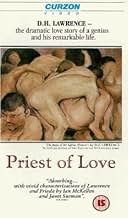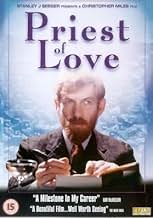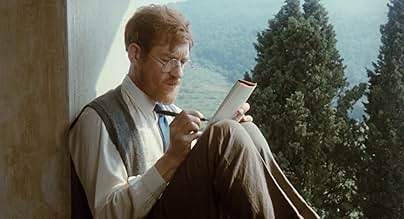Following the banning and burning of his novel, "The Rainbow", D.H. Lawrence and his wife, Frieda, move to the United States, and then to Mexico. When Lawrence contracts tuberculosis, they r... Read allFollowing the banning and burning of his novel, "The Rainbow", D.H. Lawrence and his wife, Frieda, move to the United States, and then to Mexico. When Lawrence contracts tuberculosis, they return to England for a short time, then to Italy, where Lawrence wrote "Lady Chatterley's ... Read allFollowing the banning and burning of his novel, "The Rainbow", D.H. Lawrence and his wife, Frieda, move to the United States, and then to Mexico. When Lawrence contracts tuberculosis, they return to England for a short time, then to Italy, where Lawrence wrote "Lady Chatterley's Lover".
- Director
- Writers
- Stars
- Dr. Uhfelder
- (as Mike Morris)
- Director
- Writers
- All cast & crew
- Production, box office & more at IMDbPro
Featured reviews
Christopher Miles did a wonderful adaptation of "The Virgin and the Gypsy" 10 years before he made this film. He certainly is a scholar of Lawrence and a talented filmmaker, so why was this film so charmless and seem so shallow.
I will give a couple of reasons: First, I saw the 99 minute recut of the film. I imagine/hope that the apparently lost original 125 minutes was less choppy and jumpy.
Second, Ian McKellan was a terrible choice for the lead. He simply was too much of a stage actor at this point of his career and he plays most scenes for the the benefit of the baloney.
Third, the beginning shows Lawrence having a nude swim with a homosexual lover. The rest of the movie is about his love affair with his German wife. It is just confusing and undercuts the rest of the movie as we expect him to run off and leave his wife for a man at some point.
Fourth, the movie portrays Lawrence as a one dimensional lone victim of censorship, surely there were other writers being censored at the time and many powerful people supporting his rights to freedom of speech. Making the censor a buffoon (played dully by John Gielgud) doesn't help, but seems to trivialize the issue.
Fifth, Miles may have been to close to the material. He wants to give us a lot of factual information about Lawrence, but the history lesson feels like a history lesson, and there is little dramatic tension. Janet Suzman as Frieda Lawrence seems to carry the weight of whatever dramatic tension there is.
The movie does have nice cinematography. However all the movies adapted from Lawrence's work also have great cinematography and much better characters and stories.
The film is just a bog standard biopic done from the write by numbers playbook. It hardly ever come close to the real D H Lawrence. The facts and events are there, all the wandering around the world etc, but you only have to read Lawrence's collected letters to know that the picture given here is rather superficial It isn't helped by some amateur dramatics style acting, particularly from a way below par Ian McKellen and Janet Suzman. A pet hate of mine is the lazy generic Northern accent adopted by most actors doing D H Lawrence. Ian McKellen made him sound as though he was brought up in Yorkshire rather than Notts. Admittedly the Nottingham/Derbyshire accent is hard to do. Robert Lindsey does it well, but then he comes from Ilkeston.
The other thing missing in this film is a sense of D H Lawrence's wit and humour, which can be seen very well in his letters, short stories and some of his poems. I also didn't like the way the script writer (Alan Plater in his soap writing mood) somewhat lazily bought into the feminist critique of the 1980s. D H Lawrence, who wrote very sensitively on women's issues, is made to seem as though he was a male chauvinist. Again, a more careful reading of his works would have shown this to be untrue.
So, overall, a pleasant enough journey round the world with some nice scenery and some good support actors. As another reviewer has pointed out, a bit like a dramatisation of an encyclopedia entry.
It is therefore perhaps not surprising that after the war Lawrence and Frieda decided to leave Britain and to lead a peripatetic existence wandering around the world, a journey that would take them to France, Italy, Australia, Mexico and the USA. They did so partly because Lawrence needed a warmer climate for the sake of his health- he was suffering from the tuberculosis that would eventually kill him- but the way in which he had been treated in the UK must also have been a factor. The film follows them on their journey and also deals with the writing of Lawrence's last and most controversial novel, "Lady Chatterley's Lover", compared to which "The Rainbow" is about as racy as a children's nursery rhyme.
Although the film features some major names of the British cinema and a bona fide Hollywood goddess in the shape of Ava Gardner, it seems to have aroused little attention. It was not a success on its release in 1981, and I had never heard of it before I recently caught it on television. I note that mine is only the third review of it on this site which suggests that few other people had heard of it either.
And the reason nobody seems to have heard of it is that, frankly, it is not very good. Probably the best acting comes from John Gielgud in a cameo as the pompous Herbert G. Muskett, the reactionary functionary charged with protecting the British people from exposure to literature and who seemed to take a particular delight in persecuting Lawrence. None of the other cast members, however, stand out. Although the title hints at Lawrence's passionate nature, you get little idea of this from Ian McKellen's surprisingly passionless performance. Janet Suzman's Frieda seems too unsympathetic, with the sort of cinematic German accent more normally associated with Nazis barking "ve haff vays und means". Both these performances came as a disappointment to me, because both McKellen and Suzman have been much better in other films.
The screenplay was based upon a non-fiction biography of Lawrence, not always the best source to use when making a fictionalised biopic. The resulting film is just a tedious drawn-out chronicle of two people, one of them seriously ill, journeying around the world, with various artistic and literary celebs from the 1920s occasionally popping up. ("Oh look! Is that Aldous Huxley over there? And could that be Katherine Mansfield? Quick, or else you'll miss her"). Screenwriter Alan Plater and director Christopher Miles might just as well have tried to film the entry on Lawrence from the Encyclopaedia Britannica. Had they done so the result could hardly have been duller than what they actually came up with. 4/10
After leaving England the movie has the Lawrences landing in Taos, New Mexico where they were closely associated with the wealthy patron of the arts Mabel Dodge Luhan and the artist Dorothy Brett. In exchange for the original text of "Sons and Lovers" Dodge gave them a 160 acre ranch outside of Taos--a ranch that is now known as the Lawrence Ranch. The British artist Dorothy Brett lived on the ranch with the Lawrences, in a separate dwelling. Here is where the weakness of the movie started to become apparent to me and that is the lack of motivation for behavior. What was the basis of the Lawrence's relationship with Brett that resulted in their being close enough to come to the United States together and live on the same ranch.
The motivations for the various moves from country to country are not well established and the transitions are confusingly abrupt. Maybe what prompted the moves were no more than whims, but without any notice the Lawrences were all of the sudden in some place in Mexico, or some place in Italy, or some other place in Italy, on in Capri, or France. The same goes for the people in their lives. How did they ever get to know Mabel Dodge, or any of the other famous people that drifted in and out of their lives? There was no identification of these people beyond sometimes being given their names. For example, while in England we see the Lawrences socializing with John Middleton Murry and his paramour Katherine Mansfield, the latter not even being identified. People would suddenly appear, taking me some time to figure out who they were, like Lawrence's sister Ada. There were scenes that had Aldous Huxley visiting the Lawrences in Italy with the primary interaction between Huxley and Lawrence being over Huxley's painting an external wall lamp. Surely some relevant dialog could have been inserted there.
Ian McKellen gives a good performance as Lawrence, but even at that we get only a hint of an understanding of this complex man--I think I came away with a better understanding of Frieda than of her husband. We get only a hint of Lawrence's homosexual tendencies from an early scene that has him frolicking naked on the beach with a young friend. Dorothy Brett is portrayed as being a grinning simpleton. For her to have been a close friend to the Lawrences, surely there was more to the woman than what we see here.
Of course time is devoted to the writing and publication of "Lady Chatterley's Lover." The music accompanying these scenes is so irritatingly over the top, I suppose to emphasize the significance, that it would be more suitable for Henry's victory at Agincourt.
Some time is spent on Lawrence's efforts at painting in his last years, with the paintings in his exhibition in London being seized and the show closed down. Some of these paintings can now be seen at the La Fonda hotel in Taos. If you ever have a chance to see them, you will be convinced that it was best for Lawrence to devote his talents to writing. To call them erotic paintings, at least at this late date, is more than an overstatement.
I suppose this movie broke some ground as being a major commercial movie that had full frontal male nudity and, as McKellen notes with pleasure in his interview on the extras, it is the first commercial movie to portray an erect penis, albeit as a shadow on a wall.
I saw this in its original release in 1981 and have looked forward to seeing it again on DVD. The "director's cut" now on DVD has been edited from the original 125 minutes to 99 minutes. My memory is not good enough to remember exactly what was cut (I do remember a scene involving Lawrence's ashes that is no longer there), but what remains on the DVD I think is more disjointed and confusing than what was in the original. The cutting is puzzling, getting at an understanding of this complicated man demands a longer movie rather than shorter.
Perhaps the most positive result of seeing this movie would be to encourage you to read Lawrence's writings.
Did you know
- TriviaThis movie was released on the 51st Anniversary year of the death of author D.H. Lawrence.
- Quotes
Herbert G. Muskett: [looking at a copy of Lawrence's book "Kangaroo"] It does not appear to be obscene in absolutely legal terms. Anti-British to the point of insanity.
Clerk to Herbert G. Muskett: Apparently, Mr. Lawrence is going to America.
Herbert G. Muskett: We must inform the authorities.
Clerk to Herbert G. Muskett: It's been attended to, Mr Muskett.
[reaching for the book]
Clerk to Herbert G. Muskett: Shall I take this?
Herbert G. Muskett: Leave it. I shall read it again. To make absolutely sure
[recommences intense study of the book]
- Alternate versionsAn abridged 99 minute "Centenary version" was released in 1985 in the UK to better box office and critical acclaim to commemorate the birth of D.H.Lawrence. As well as inevitable cutting of some material the shortened version also rearranges the placement of some of the flashback sequence and ends with Lawrence's death excluding the New Mexico epilogue. The short version is a properly re-prepared effort however with the appearance order end-credits redone to reflect the new positions in which characters first appear. Copies of the 1981 version, which was first released in the UK during the 1982 Falklands War when theatre going plummeted, now no longer exist.
- SoundtracksThe Way We Get It Together
music by Francis James Brown and Stanley Joseph Seeger (as Joseph James)
Lyrics by Christopher Cone
Played by The Pasadena Roof Orchestra
- How long is Priest of Love?Powered by Alexa






































